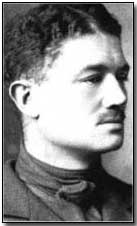Prose & Poetry - Julian Grenfell
 Julian Henry Francis Grenfell
(1888-1915) was the author of the widely anthologised Into Battle, an anthem
to British fighting spirit during the early stages of the war.
Julian Henry Francis Grenfell
(1888-1915) was the author of the widely anthologised Into Battle, an anthem
to British fighting spirit during the early stages of the war.
Born on 30 March 1888 and educated at Eton and Oxford Grenfell was commissioned into the Royal Dragoons in the summer of 1910, and was immediately despatched to India, arriving at the tail-end of the year.
Until the outbreak of war in August 1914 Grenfell served in cavalry positions in India and South Africa. With the First World War underway Grenfell was posted to Flanders where he immediately saw service during the First Battle of Ypres.
Based near Zillebeke thereafter Grenfell was awarded the Distinguished Service Order (DSO) in November 1914 for his action in stalking German snipers and dispatching them from close range. Noted (and much respected) for his bravery Grenfell was twice mentioned in despatches.
Offered a staff position with General Pulteney in the wake of his award he chose instead to continue serving in the front line, believing he would be of better use to his country in active commands.
Seriously wounded by shrapnel while serving near Ypres at Hooge he was taken to hospital in Boulogne where he died after two failed operations on 26 May 1915. The announcement of his death in The Times three days later - the date of his burial in Boulogne - was accompanied by publication of his most famous poem, Into Battle.
Never claiming literary aspirations, Grenfell's other published poems (including Prayer for Those on the Staff) were not of the same quality - and by no means as popular - as Into Battle, which continues to be widely anthologised to the present day.
Into Battle
The naked earth is warm with spring,
And with green grass and bursting trees
Leans to the sun's gaze glorying,
And quivers in the sunny breeze;
And life is colour and warmth and light,
And a striving evermore for these;
And he is dead who will not fight;
And who dies fighting has increase.The fighting man shall from the sun
Take warmth, and life from the glowing earth;
Speed with the light-foot winds to run,
And with the trees to newer birth;
And find, when fighting shall be done,
Great rest, and fullness after dearth.All the bright company of Heaven
Hold him in their high comradeship,
The Dog-Star, and the Sisters Seven,
Orion's Belt and sworded hip.The woodland trees that stand together,
They stand to him each one a friend;
They gently speak in the windy weather;
They guide to valley and ridge's end.The kestrel hovering by day,
And the little owls that call by night,
Bid him be swift and keen as they,
As keen of ear, as swift of sight.The blackbird sings to him, "Brother, brother,
If this be the last song you shall sing,
Sing well, for you may not sing another;
Brother, sing."In dreary, doubtful, waiting hours,
Before the brazen frenzy starts,
The horses show him nobler powers;
O patient eyes, courageous hearts!And when the burning moment breaks,
And all things else are out of mind,
And only joy of battle takes
Him by the throat, and makes him blind,Through joy and blindness he shall know,
Not caring much to know, that still
Nor lead nor steel shall reach him, so
That it be not the Destined Will.The thundering line of battle stands,
And in the air death moans and sings;
But Day shall clasp him with strong hands,
And Night shall fold him in soft wings.
A "box barrage" was an artillery bombardment centred upon a small area.
- Did you know?
